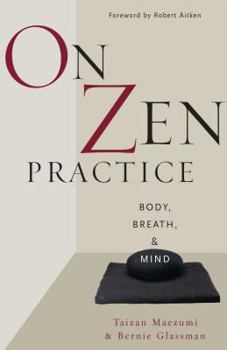On Zen Practice: Body, Breath, and Mind
This updated landmark volume makes available for the first time in decades the teachings that were formative to a whole generation of American Zen teachers and students. Conceived as an overarching... This description may be from another edition of this product.
Format:Paperback
Language:English
ISBN:086171315X
ISBN13:9780861713158
Release Date:October 2002
Publisher:Wisdom Publications
Length:208 Pages
Weight:0.70 lbs.
Dimensions:0.6" x 6.1" x 8.9"
Customer Reviews
1 rating
Maezumi Was Truly a Great Teacher
Published by Thriftbooks.com User , 20 years ago
Taizan Maezumi Roshi, next to Korean Zen master Seung Sahn, is absolutely my favorite of masters who have lived and taught in modern times. In this book Maezumi Roshi covers pretty much every single aspect of Zen training. Like in his other works, Maezumi Roshi is fascinated by Zen master Dogen and spends a lot of time in his works touching upon his wealth of teachings. This book has a section on the significance of bowing in our Zen traditions, and what it truly means when you are prostrating yourself. Full prostrations is one form of Zen practice that I have seen various westerners in some ways resent. I myself didn't exactly love it when I first visited a Zen center. In this work, Maezumi Roshi uses Master Obaku, founder of one of the 5 schools of Zen in Japan, as an example on the importance and meaning behind bowing."Master Obaku, the teacher of Rinzai, was famous for his frequent admonition to his students: "Don't expect anything from the Three treasures." Time after time he was heard to say this. One day, however, Master Obaku was observed in the act of bowing and was challenged about his practice. "You always tell your students not to expect anything from the Three Treasures," said his questioner, "and yet you have been making deep bows." And in fact, Master Obaku had been bowing so frequently and for so long that a large callous had formed on his forehead at the point where it touched the floor. When asked how he explained this, Master Obaku replied, "I don't expect. I just bow."That's some very cutting advice Obaku is giving there. In my own lineage, we have always been instructed to take each bow on as though it is your only bow. Just that. Then you get up, and you bow again. Only hapchang (gassho). Let us just bow. This is the wonderful simplicity of Zen practice, while bowing prostrations are rigorous and physically demanding, we receive that simple instruction: Just bow. It makes things less complicated for us. It brings forth our Buddha mind, or our "only practice mind." So come take a walk with Taizan Maezumi Roshi, won't you? I wish you do, for he was a true bodhisattva that lived among us.




